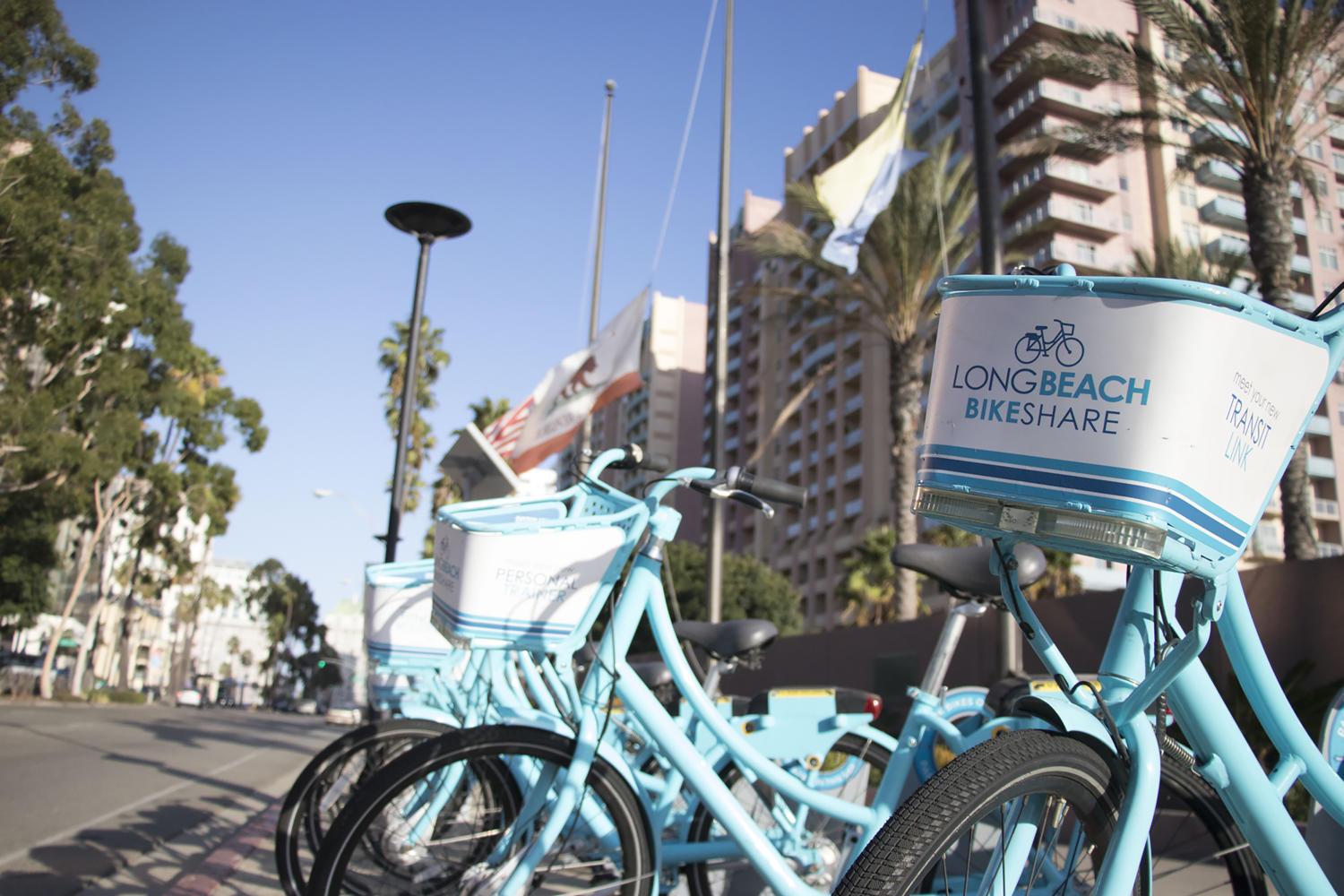By reducing greenhouse gas emissions, students can breathe easier — or maybe, harder — in the coming months when Cal State Long Beach brings Bike Share’s bright blue bicycles to campus.
To start off the city’s bike share program in 2016, the City of Long Beach partnered with CycleHop, the “largest ‘smart bike’ bike share program operator in North America.” Funded by a $2.3 million Call for Projects grant from the Los Angeles County Metropolitan Transportation Authority, the city projects at least 50 stations with 500 bikes will be distributed throughout Long Beach by the time the program is fully implemented in the city.
Currently, Long Beach Bike Share charges $7 for a 60-minute ride with an additional 12 cent fee for every minute over the hour. Alternatively, users can pay $21 for a one-time three-hour ride and get one additional hour fee. However, Long Beach Bike Share offers a student plan for $7.50 which includes a free, 90-minute daily ride for users.
Long Beach Bike Share plans to partner with the campus, but the groups have been “working on [this] for a long time,” according to Melissa Soto, the university’s campus planner and project manager.
Locations for the bike stations and number of bikes they will hold have already been picked out, but have not yet been approved.
“We don’t want to take the prime spots for students who are already using their bikes,” Soto said. “It’s about finding the balance between where they’re in a convenient location where people will be able to cruise in on their Bike Share bike, and also not taking up space for people who are already using it.”
The bike share program is expected to reduce campus greenhouse gas emissions, particularly in regards to student and faculty commuters, which accounts for 58.5 percent of the total pollution generated by campus.
The city plans to fund the program at no cost to the university or its students. Additional bike racks will not be installed on campus. Instead, the blue bikes are going to be put on already existing racks. There will also be a promo code for a $20 annual plan for students when the program begins on campus.
It’s easier to bike across campus than to go through the hassle of moving parking spaces, according to sustainability coordinator Holli Fajack.
The rental bikes may alleviate car parking issues, but some students are concerned that bike parking problems will arise.
“It might be a little tough for people that bike around here, so it’s going to be a little rough,” said Vinh Nguyen, senior biology major. “But with rental bikes there are some benefits to it, like people that park at the parking structures, they’ll get to class easier.”
The purpose of the program is to support sustainability and reduce the city’s carbon footprint. By introducing bike shares. According to Vice Mayor Suja Lowenthal in a statement concerning the bike share system released by the City of Long Beach in 2016, this is an conscious environmental effort.
“[Bike Share will improve] the City’s robust transportation programs that focus on pedestrians, bicyclists and transit users,” Lowenthal said.
The university’s Parking and Transportation Services were not able to comment on the impact of the bike share program on parking due to the uncertainty of the situation, but the results of limited parking on campus have been documented by the Daily 49er.
Parking and Transportation Services has coped with this semester’s surplus of students with overflow parking in September. Though traffic still remains heavy on campus, commuting students are adjusting to the impacted lots. Soto said she believes that the implementation of the bike share system will benefit students in the long-term especially those still frustrated with finding parking.
“It really is a shift into changing your routine because it’s really easy to wait until the very last possible minute and hop in your car,” Soto said. “You’re not going to hit any traffic on a bike. There’s always going to be a parking space for your bike, and you can go right up to the building.”
Long Beach is not the first college to see a bike share program come onto its campus. Earlier this year, University of California, Los Angeles also launched its Bruin Bike Share program by partnering with CycleHop. University of California, Irvine has a similar program with its ZotWheels, introduced in 2008, where they partnered with Collegiate Bicycle Company.
Biking may help the environment, but it might also help students’ mentally.
“I go from working all day to being in traffic to then being home and there’s no break to just sort of take a breath,” Fajack said. “It feels so good to just ride past a bunch of cars. You feel like you’re flying.”
Editors note: this article was updated Oct. 5, 2017.




